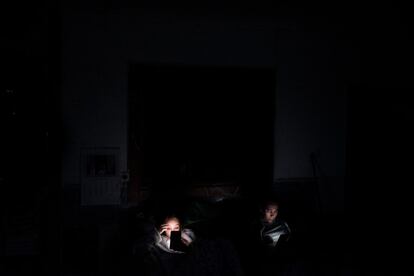How spending too much time in front of the computer affects the brain
A new study in fruit flies has found that blue light, which is emitted by electronic devices, can be hazardous to health

Today, much of our social and work life takes place online, from Skype calls with friends and educational courses to work meetings and training. This shift has happened not only as a way to avoid contagion during the Covid-19 pandemic, but also as a way to save time, to reach larger audiences and increase revenue.
But on the downside it has led to a loss of face-to-face contact, which can have negative consequences, particularly when it comes to education. What’s more, there are also health impacts to consider. New scientific research indicates that spending large amounts of time in front of the computer, or other devices such as tablets and cell phones, can be harmful to our health. This is largely due to the blue light emitted by electronic devices, which expose us to light-emitting diodes (LEDs).
Light is the brain’s way of consciously feeling and perceiving electromagnetic waves, a type of energy that is present everywhere in the universe. Blue light is a very short wave that emits more energy than other colors in the visible spectrum, such as green, yellow or red, which makes it more dangerous. Despite this, both humans and animals can receive it without noticeable consequences. The Sun and many fluorescent and incandescent light bulbs emit blue light.
In the modern world, people receive an extra dose of blue light from computers, cellphones, flat screen televisions and tablets. The lenses of our eyes (cornea and crystalline) protect the sensitive retina from being damaged by very short and dangerous waves such as ultraviolet waves, but they do not protect it to the same degree from blue light, and that is why being exposed to it for long periods of time can be harmful.
During the Covid-19 pandemic, many people spent more than nine hours a day in front of a screen. And today, this trend is still present: more people work and communicate online. But this could have dangerous consequences, especially for young children who are not aware of the risks of blue light exposure.
That said, there is debate about the pros and cons of blue light. Some research indicates that blue light can have a positive effect on health, with studies suggesting it reduces seasonal affective disorder, helps us stay awake and enhances memory and other cognitive processes. Other research links it to retinal diseases and related conditions such as photoreceptor cell death, glaucoma or macular degeneration and sleep disturbance.
But a study on invertebrates may tip the balance, if the findings are confirmed in humans. What’s interesting about the research is that it looked at whether prolonged exposure to blue light affects the brain as a whole, and as a result, overall health. In the study, which was published in Frontiers, researchers experimented with fruit flies (Drosophila melanogaster) with genetically ablated eyes. The goal was to assess how blue light affects the brain if it does not pass through the retina.

What they observed was that the flies subjected to 14 days of blue light – compared to the flies that were not exposed or exposed for less time – had reduced levels of several neurotransmitters including glutamate and Gamma-aminobutyric acid, highly elevated levels of succinate and reduced levels of pyruvate, a molecule that plays an important role in energy production.
Furthermore, the flies kept in blue light for 14 days – the lifespan of a fruit fly – aged faster and suffered from greater brain neurodegeneration. In other words, even though the flies did not have eyes, they had shortened lifespans, possibly due to the constant blue light exposure. The researchers believe that this accelerated aging was due to the observed metabolic changes.
Although these results have not been observed in humans, the physiological impacts reported in invertebrates and vertebrates suggest that blue light may be able to affect the human brain and its healthy functioning. While there are no definitive scientific conclusions, given the current evidence, it is best to avoid devices that emit blue light, a warning particularly important for children.
Sign up for our weekly newsletter to get more English-language news coverage from EL PAÍS USA Edition
Tu suscripción se está usando en otro dispositivo
¿Quieres añadir otro usuario a tu suscripción?
Si continúas leyendo en este dispositivo, no se podrá leer en el otro.
FlechaTu suscripción se está usando en otro dispositivo y solo puedes acceder a EL PAÍS desde un dispositivo a la vez.
Si quieres compartir tu cuenta, cambia tu suscripción a la modalidad Premium, así podrás añadir otro usuario. Cada uno accederá con su propia cuenta de email, lo que os permitirá personalizar vuestra experiencia en EL PAÍS.
¿Tienes una suscripción de empresa? Accede aquí para contratar más cuentas.
En el caso de no saber quién está usando tu cuenta, te recomendamos cambiar tu contraseña aquí.
Si decides continuar compartiendo tu cuenta, este mensaje se mostrará en tu dispositivo y en el de la otra persona que está usando tu cuenta de forma indefinida, afectando a tu experiencia de lectura. Puedes consultar aquí los términos y condiciones de la suscripción digital.









































